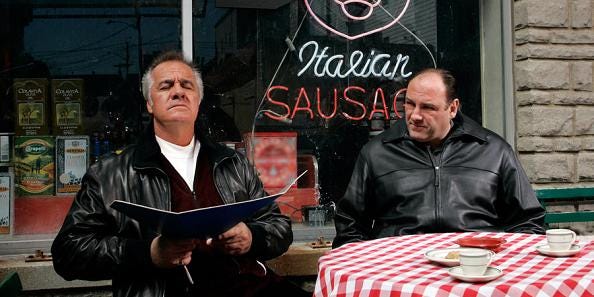Reflection 1 — “Being good doesn't get you anywhere in life”
There’s an incredibly powerful lesson in season six of The Sopranos when Tony is shot, nearly dies, goes into a coma and comes out of it quasi-reformed.
The near-death experience makes him more grateful to be alive. He begins to cherish life more. He smiles more, he wants to be gentler, more compassionate. He tries to be less angry, less reactive.
And then the world punishes him for it. His enemies and his employees see his softness and he begins to lose some of his power and authority over them. His spiritual clarity becomes a financial liability.
Realizing this, Tony starts to harden again and return to his old ways. It’s one of the most honest things that the show depicts: that genuine personal transformation often just doesn’t work in the worlds we’ve built for ourselves.
It’s the philosophy of you live by the sword, you die by the sword.
This episode is a microcosm of our society in general. In a society ruled by self-interest and ruthless competition, what happens when you're driven less by ambition and more by meaning? You lose your advantage, your leverage. You fall behind materially.
That’s why you’ll hear people say “being good just doesn’t get you anywhere.”
But this is only ever half true. Yes, sometimes no amount of personal change can save you from the environment you’re in. But this doesn’t mean dropping out, it just means altering your environment enough.
Tony’s mistake was thinking he could be a better man in an environment that required him to be a worse one.
Reflection 2 — The muscular instinct
For a lot of men, figures like Tony Soprano and Don Corleone represent the kind of action and decisiveness they wish they had in their own lives. Those men get the job done. They make the hard decisions, restore order to chaos, pull the trigger when needed.
We know they’re morally compromised. We know they’re criminals. But we envy their muscular instinct, their soldier’s duty.
These characters serve as a kind of a catharsis for men. They soothe the ache of impotence, of unrealized strength, that many men feel in their lives.
Tony functions as a surrogate warrior, allowing men to feel powerful and muscular, even if only through a screen.
A related question: What is the female equivalent? Is there a female archetype that offers this same vicarious thrill? What character does for women what Tony Soprano does for men?
Reflection 3 — The limits of therapy
Tony spends years in therapy, which to a modern audience is always a sign of progress — he’s trying to be self-reflective, vulnerable and seek change. But from the perspective of the wisdom traditions, this can sometimes be a superficial peeling of the onion.
You may be learning how to clean up the messes in your mind, but unless you change the room you’re in, the deeper suffering remains untouched.
And what is this “room”? The room is your fundamental orientation to life. Your deeper commitments and values. The unexamined assumptions you live with, the identities you cling to.
For Tony, the “room” is his worldview as a boss, a warrior, a gangster, as a man who must dominate others to win. This isn’t just ‘bad’ behavior, it’s his character structure. It’s his entire psychological ecosystem.
Changing the room would mean radically challenging the assumptions that currently govern his life. In this way, The Sopranos is a meditation on the limits of psychological insight without serious spiritual and moral reevaluation.
This week’s discussion club was on The Sopranos. The next session will be on True Detective (S1). Message me if you’d like to attend.



Succinct and thoughtful. The observation about therapy is extremely relevant when everyone uses therapy to virtue signal.
By not being good, you are living in hell everyday.